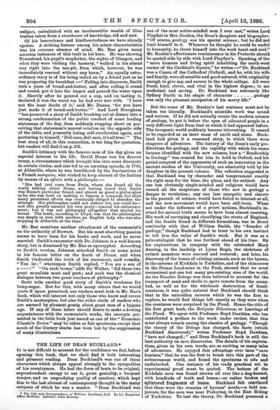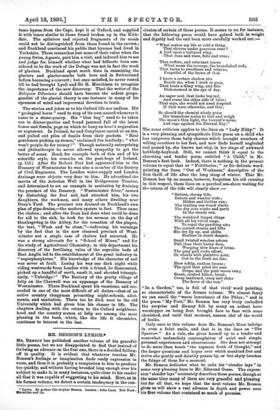THE LIFE OF DEAN BUCKLAND.*
IT is not difficult to account for the confidence we feel, before opening this book, that we shall find it both interesting and pleasant reading. Dean Buckland's was one of those characters which always appeal strongly to the sympathies of his countrymen. He had the force of brain to be original, superabundant energy to use it, great geniality, a buoyant temper, and an ungrudging quality of candour, which kept him to the last abreast of contemporary thought in the many subjects of which be was a master. "Dean Buckland was • The Life and Correspondence of William Bud:land, D.D. By bis Daughter 411r s. Gordoul. London: dolui Murray.
one of the most active-minded men I ever met," writes Lord Playfair to Mrs. Gordon, the Derarli daughter and biographar.
"Of course, geology was his special science ; but he did not limit himself to it. Whenever he thought he could be useful to humanity, he threw himself into the work heart and soul." Mr. Ruskin's affectionate reminiscence in his Prxterita should be quoted side by side with Lord Playfair's. Speaking of the "more humane and living spirit inhabiting the north-west corner of the Cardinal's Square," he writes :—" Dr. Buckland was a Canon of the Cathedral (Oxford), and he, with his wife and family, were all sensible and good-natured, with originality enough to give sap and savour to the whole college. All were frank, kind, clever, and vital in the highest degree; to me medicinal and saving. Dr. Buckland was extremely like Sydney Smith in his staple of character geology was only the pleasant occupation of his merry life."
But the sense of Mr. Ruskin's last sentence must not be taken too literally. Buckland's scientific work was sound and serious. If he did not actually create the modern science of geology, he put it before the eyes of educated people in a very different light from that in which it had appeared before. The inorganic world suddenly became interesting. It ceased to be regarded as an inert mass of earth and stone. Buck. land had given it a reasoned story, in which there were chapters of adventure. The history of the Dean's early pre- dilections for geology, and the rapidity with which his name became identified with the new science, how a " Readership in Geology" was created for him to hold in Oxford, and his genial conquest of the opponents of such an innovation in the ancient studies of the University, are admirably told by his daughter in the present volume. The reflection suggested is that Buckland was by character and temperament exactly the right man for the time, the place, and the subject. Any one less obviously single-minded and religious would have roused all the suspicions of those who saw in geology a danger to revelation; any one less energetic and sincere in the pursuit of science, would have failed to interest at all, and the new movement would have been still-born. When not under the influence of a priori notions, Buckland's stinct for natural truth seems to have been almost unerring. His work of surveying and classifying the strata of England, and the fossils found in different formations, was in direct continuity with that of William Smith, the "founder of geology," though Buckland had to trust to his own instinct to tell him the value of Smith's work. But it was as a palaeontologist that he was furthest ahead of his time. By his explorations in company with the celebrated Mary Alining, in the landslip at Lyme Regis, the skeletons of extinct monsters were rescued and restored ; and later, his discovery of the bones of existing animals, such as the hymns, in the caverns of Kirkdale in Yorkshire, and of the rhinoceros in the Dream Lead-mine in the Peak, showed that we must reconstruct not one but many pre-existing eras of the world. As the Noachic Deluge was then believed to account for the transport of sand and shells to spots remote from the ocean- bed, as well as for the wholesale destruction of fossil- creatures, it was quite natural that Buckland should think that in the untrodden caverns which he was the first to explore, he would find things left exactly as they were when the creatures were surprised by the Flood. Hence the title of his first great book, the Reliquin Diluvianw, or Leavings of the Flood. We agree with Professor Boyd Dawkins, who has contributed a preface to the work under review, that this must always remain among the classics of geology. "Though the theory of the Deluge has changed, the facts (which Buckland discovered)," writes Professor Boyd Dawkins, "have not changed ; " and Dean Buckland's book is still the best authority on cave discoveries. The details of his explora. tions, given in his own words, are as exciting as many tales of adventure. He enjoyed this advantage over later "cave hunters," that he was the first to break into this part of the subterranean world, and found the specimens in situ and undisturbed. One instance of his ready practical wit in experimental proof must be quoted. The bottom of the Kirkdale cave was found strewn all over like a dog-kennel, with hundreds of teeth and bones,--or rather broken and splintered fragments of bones. Backland felt convinced that these were the remains of hyaenas' meals,—a bold con- jecture, for the cave was near Pickering, in the East Riding of Yorkshire. To teat the theory, Dr. Buckland procured a tame hysena from the Cape, kept it at Oxford, and supplied it with bones similar to those found broken up in the Kirk- dale. The splinters and rejected fragments of its meals could not be distinguished from those found in the cavern ; and Buckland convinced his public that hyaenas had lived in Yorkshire. These researches lost none of their value when the young Swiss, Agassiz, paid him a visit, and induced him to see and judge for himself whether what had hitherto been con- sidered to be the work of the Deluge was not in fact the work of glaciers. Buckland spent much time in examining the glaciers and glacier-marks both here and in Switzerland before becoming a convert ; but once satisfied, he never rested till he had brought Lyall and Sir R. Murchison to recognise the importance of the new discovery. That the writer of the Beliquim Diluvianw should have become the ardent propa- gandist of the glacial theory is one instance in many of his openness of mind and impersonal devotion to truth.
The stories and jokes as to his Oxford life are endless. His -" geological horse " used to stop of its own accord whenever it came to a stone-quarry. His " blue bag " used to be taken out to dinner-parties and found jammed full of the latest bones and fossils, pegs on which to hang an hour's suggestion or argument. In Ireland, he and Conybeare rested at an inn, and pulled out piles of fossils from their pockets. " Real gentlemen picking np stones," exclaimed the landlady; "what won't people do for money !" Though naturally enterprising and philanthropic he never allowed sympathy to get the better of sense. Read, for example both of this and of his scientific style, his remarks on the peat-bogs of Ireland. (p. 153.) After Sir Robert Peel had appointed him to the Deanery of Westminster he was also a member of the Society of Civil Engineers. The London water-supply and London drainage were objects very dear to him. He advertised the merits of the Artesian Well in the Bridgewater Treatise, and determined to set an example in sanitation by draining the precinct of the Deanery. " Westminster fever," caused by disturbing the foul soil, had attacked him, his two daughters, the workmen, and many others dwelling near Dean's Yard. The precinct was drained on Buckland's own plan of pipe-drains,—the modern system in fact. Then came the cholera ; and after the Dean had done what could be done for aid to the sick, he took for his sermon on the day of thanksgiving in the Abbey, for the cessation of the plague, the text, " Wash and be clean,"—enforcing his warnings by the fact that in the now cleansed precinct of West- minster not a single case of cholera had occurred. He was a strong advocate for a "School of Mines," and for the study of Agricultural Chemistry; in this department his discovery of the fertilising value of the coprolite beds of East Anglia led to the establishment of the great industry in 4‘ superphosphates." His knowledge of the character of soil was never at fault. Losing his way one dark night while riding westwards from London with a friend, he dismounted, picked up a handful of earth, smelt it, and shouted triumph. antly, " Uxbridge l" The Rectory of the pretty village of Islip on the Cherwell was an appanage of the Deanery of Westminster. There Buckland spent his vacations, and suc- ceeded in one of the moat difficult of all duties—that of an active country clergyman promoting night-schools, allot- ments, and sanitation. There too he died, near to the old University which had given him his chance in life. The chapters dealing with the return to the Oxford neighbour. hood and the country scenes at Islip are among the most pleasing in the book, which, like the life it chronicles, continues to interest to the last.



































 Previous page
Previous page